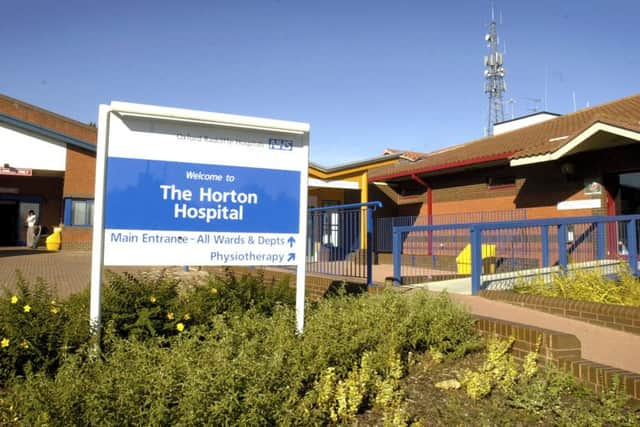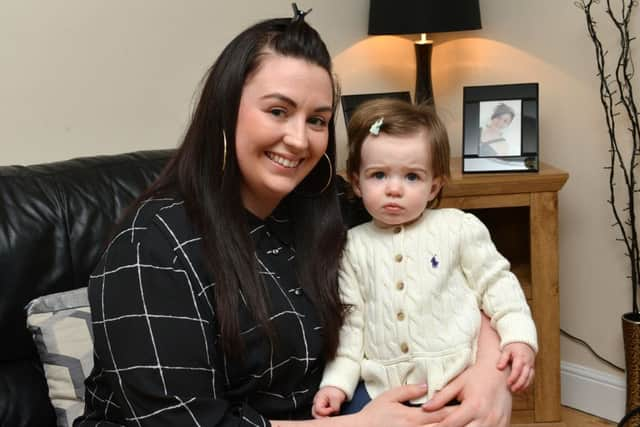Banbury campaign group calls for statement on maternity plan at Horton


Keep the Horton General (KTHG) – the campaign group set up to protect acute services at the Horton General Hospital – called for reassurance that consultant-led services will remain in Banbury to ensure safe childbirth for mothers in the fast-growing area.
Last week, Dr David Richmond, Royal College of Obstetricians and Gynaecologists president, said 10 to 20 per cent of maternity units run by consultants should become midwife-led units because of a shortage of specialists.
Advertisement
Hide AdAdvertisement
Hide AdNo mention was made of specific hospitals but if the Horton Maternity Hospital was downgraded, fewer mothers would be allowed to deliver there and those who developed complications in childbirth would have to go by ambulance 23 miles to Oxford.


KTHG chairman Keith Strangwood said: “Following an exhaustive enquiry from 2006-8, the Independent Reconfiguration Panel (IRP) issued six rulings to ensure full services were maintained at the Horton.
“Its report said the IRP does not support proposals to reconfigure services in paediatrics, obstetrics, gynaecology and the special care baby unit (SCBU) at Horton Hospital and I quote ‘The IRP does not consider (the proposals) will provide an accessible or improved service to the people of north Oxfordshire and surrounding areas’.
“Nothing has changed since the IRP report. However the population is rapidly expanding, house building is booming and there is more traffic to clog up the route from Banbury to the Oxford hospitals,” he added.
Advertisement
Hide AdAdvertisement
Hide Ad“It is vital our services are maintained for the people of Banburyshire to access with relative ease. Apart from anything else there is a widely acknowledged, acute shortage of midwives. How does Dr Richards intend to staff these midwife led units?”


A group of 86 Banburyshire GPs unequivocally opposed ending consultant-led maternity. In a joint statement they told the IRP: “Mothers who may fail to progress or show signs of foetal distress in the second stage of labour, or who have prolapsed cord or haemorrhage would require very rapid transfer to Oxford.
“Given the numbers involved this would carry significant risk and would be inhumane...babies born in need of immediate resuscitation would incur a transit time of approximately one hour.
“The idea that paediatric cover could be provided safely from Oxford in these circumstances is false and dangerous.”
Advertisement
Hide AdAdvertisement
Hide AdBanbury mum Kayleigh Applin said removing consultant-led care from the Horton General Hospital’s maternity unit would be so ‘scary’ for parents they would think twice about having a baby.
Ms Applin of Ruscote Avenue had her first child, Imarni-Leigh, at the Horton on new year’s eve 2014.
“I had a few complications and had to go into hospital before the birth so decisions could be taken about what should happen,” she said.
“I did have my baby there but I can’t imagine how scary it would be to be in full-on labour and have a complication arise and then have to be transferred to Oxford.
Advertisement
Hide AdAdvertisement
Hide Ad“Anything can happen and it’s a long journey. If the Horton couldn’t accept difficult births it would make me thin twice about another baby. It’s a long way and a complicated journey.”
A midwife, who did not want to be named, said: “To compromise the ability for an immediate response to an emergency surrounding childbirth is not acceptable. Midwives promote, support and advocate normality.
“At the Horton dedicated, skilled, experienced midwives are trained to recognise and respond when things deviate from normal, working closely alongside doctors to ensure safe outcomes when they do.
“Removing in-house, time-critical access to such experts as obstetricians, anaesthetists and paediatricians is not a safe option. This would see an immediate increase in women during childbirth having to be sent by ambulance to the JR, putting them and their babies at risk because it is too far away.
Advertisement
Hide AdAdvertisement
Hide Ad“ Banbury and its surrounding villages are all getting bigger and with the birth rate at the Horton rising year on year, the JR doesn’t have the staffing to cope with its own women/birth rate, let alone the hundreds of extra they would have to accommodate if the Horton downgrades.
“For the Trust to even consider downgrading the Horton would be a catastrophe in the making.”
Paul Brennan, director of clinical services at OUHT said: “Over the coming months we are working with health and social care colleagues on developing a strategic plan for Oxfordshire that takes account of national guidance and local need and with the aim of securing long-term clinically and financially viable services.”
The Oxfordshire Transformation Board, made up of various health trusts, the county council and Oxfordshire Clinical Commissioning Group, said: “We are looking at the way we provide all our services, including maternity services, to see what changes we need to make to provide the best possible health service to patients near to home.
Advertisement
Hide AdAdvertisement
Hide Ad“We will look at all services with an eye to designing the best possible services that meet local needs, deliver high quality, safe services and are in line with clinical best practice. We will be involving patients and other members of the public as our thinking on possible ideas are developed.”
Cathy Warwick, chief executive of the Royal College of Midwives, said: “The RCM is concerned that centralising of maternity units could result in hospitals delivering more than 10,000 babies a year.
“Their size makes them difficult to provide personalised high quality care and we hear from midwives they are not always attractive places to work.
“It is vital the RCM and RCOG work together to find solutions to the shortages of both doctors and midwives.
Advertisement
Hide AdAdvertisement
Hide Ad“We await the English National Maternity Review which we hope will provide clear evidence and recommendations on future maternity provision in England.”
Elizabeth Duff of the National Childbirth Trust said: “We’d like to see a UK-wide obstetric service where care can be provided without pregnant women having to travel long distances which can be uncomfortable and dangerous.”